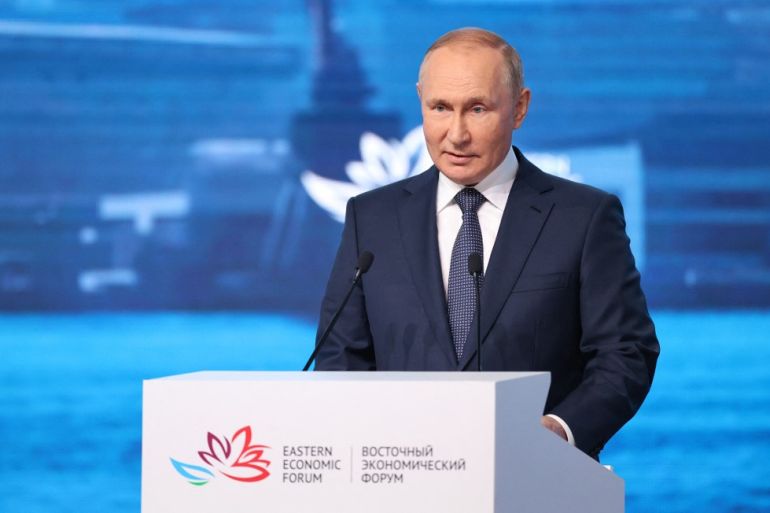‘Almost all’ Ukrainian grain reaching European nations: Putin
Ukraine denies the Russian leader’s claims that grain export under UN-backed deal to ease the global food crisis was mostly helping EU.

Russian President Vladimir Putin has claimed that “almost all” the Ukrainian grain shipped under a UN-backed deal to ease a global food crisis was reaching rich European nations, an accusation denied by Ukraine.
Putin said on Wednesday that the Ukrainian grain export was helping richer European countries at the expense of the developing world.
Keep reading
list of 3 itemsUN expects ‘big uptick’ in ships wanting to export Ukraine grain
UN ship carrying Ukraine grain to Africa stuck in port
“Almost all the grain exported from Ukraine is sent not to the poorest developing countries, but to EU countries,” he told an economic forum in Russia’s Pacific port of Vladivostok.
But Ukraine’s Foreign Minister Dmytro Kuleba in a statement denied the claims made by Putin, who ordered his forces to invade Ukraine in February leading to disruption in grain exports. Both Ukraine and Russia are two of the biggest exporters of wheat and other grain.
“In total, two-thirds of the ships sent are directed to Asia, Africa, and the Middle East,” Kuleba said, adding that the recovery of Ukrainian food exports through the “grain corridor” had a positive effect on the reduction of prices as in August, after first shipments were completed, wheat prices fell by at least five percent.
“The Russians’ fakes about sending Ukrainian grain only to Europe simply do not correspond to reality,” Kuleba said.
Designed to help ease global food prices by increasing supplies, the pact has been the only diplomatic breakthrough between Moscow and Kyiv in more than six months of war.
Acting as ‘colonialists’
But Putin said the accord was delivering grain, fertiliser and other food to the European Union rather than to developing countries.
He accused European countries of acting as “colonialists” and said they “once again simply deceived developing countries”.
“With this approach, the scale of food problems in the world will only grow,” the Russian leader said.
“Maybe we should think about limiting the export of grain and other produce along this route?” he asked.
But data compiled by a joint centre in Istanbul monitoring the July agreement showed slightly more than a third of the grain delivered to European countries and another 20 percent arriving in Turkey. Spain and Egypt are big recipients of the grain too, the data showed.
It also showed 30 percent reaching “low and lower-middle income countries” across the world.
“I don’t think that the Russian explanation on this particular issue reflects the reality on the ground,” said Tarik Oguzlu, professor of international relations at Istanbul Aydin University.
“I think the Russians are feeling a growing exposure to Ukrainian attacks in recent days, and also the Europeans are increasing pressure on Russia, so I think the Russian leadership might have decided to find a way to inflict damage [given] this growing assault,” he told Al Jazeera.
More shipments are expected to start arriving in famine-stricken parts of Africa and the Middle East under the UN World Food Programme (WFP), whose implementation is just getting underway.
The separate famine relief effort spearheaded by WFP is focused on delivering wheat and maize to Africa and other parts of the world suffering shortages.
The first UN-chartered vessel docked in Djibouti on August 30 as part of a response to the drought gripping the Horn of Africa.
A second UN ship reached Turkey last week. The wheat is now being milled into flour and will then be loaded onto a new vessel and sent to Yemen at an undisclosed date.
“A third WFP-chartered vessel is today anchored at Istanbul planning to head to Ukraine and collect a further shipment of wheat,” the Istanbul centre said.
“We should see [this] as part of a larger geopolitical game. It’s part of a tit for tat [situation],” Oguzlu explained. “I find the idea that the Ukrainian ships are targeting nations other than the ones in the Global South somehow fabricated.”
But Moscow has voiced growing frustration with how the agreement was being applied.
An amendment to the deal also allowed Russia to get open access to fertiliser shipments and have some economic sanctions lifted to allow it to export its own grain.
The UN hailed the deal as the world’s best chance to ease an acute global food crisis stoked by the Black Sea grain blockade.
The July agreement brokered with the help of Turkey is valid for 120 days and may be automatically renewed without further negotiations.
However, it requires both Moscow and Kyiv to sign off on an extension.
Putin said he hoped “the situation will improve somehow”.
“We will continue insisting that this whole affair with the export of grain and our food be directed primarily to developing markets,” he said.